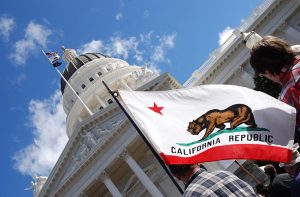 Last month I wrote to analyze aspects of the lawsuit brought against Harvard University — the country’s oldest and arguably most prestigious private institution of higher education — challenging the way Harvard evaluates Asian-American applicants for admission. In the space below, I write to discuss yet another claim of unfair treatment of Asian-American applicants, this time from the West rather than the East Coast and involving the country’s most prestigious public rather than private system of higher education — the University of California (UC).
Last month I wrote to analyze aspects of the lawsuit brought against Harvard University — the country’s oldest and arguably most prestigious private institution of higher education — challenging the way Harvard evaluates Asian-American applicants for admission. In the space below, I write to discuss yet another claim of unfair treatment of Asian-American applicants, this time from the West rather than the East Coast and involving the country’s most prestigious public rather than private system of higher education — the University of California (UC).
More specifically, UCLA law professor Richard Sander (one of my UC colleagues before I moved from the UC to take the law deanship at the University of Illinois) has joined a newly formed Asian-American advocacy organization (the Asian American Community Services Center) to ask a court to compel the UC (under California’s Public Records Act, which is what California calls its freedom-of-information statute) to turn over data that Sander believes could prove that UC campuses are illegally using race in deciding whom to admit to their undergraduate classes.
Sander is perhaps best known for his work on the so-called “mismatch” theory. The theory posits that race-based affirmative action and other so-called preference programs in higher education actually hurt their intended beneficiary groups. In legal education, for example, Sander has argued that law schools could actually increase the number of minority lawyers practicing today by moving away from affirmative action. The mismatch theory focuses on the fates of law students who attend law schools at which the median LSAT and/or college GPA numbers are substantially higher than their own. He has argued that such students, many of whom are students of color, would end up with far better law school grades — and a significantly higher chance of passing the bar exam — if they instead attend law schools that are more commensurate with their LSAT scores and college grades. He asserts that the legal education system has “mismatched” such students, placing them in schools where they are unlikely to succeed and learn.

How MyCase’s Smart Spend Can Help Increase Your Profits
This tweak to your financial management seems like a no-brainer.
Sander’s claims are controversial, and over the past decade-plus I have critiqued some of the methodological moves Sander’s writings make, and questioned some of the policy implications that he appears to embrace, even as I have agreed with him, in the legal education setting, that the State Bar of California should, if it can do so without compromising privacy, provide information that enables scholars to test his hypotheses. Other scholars have taken direct issue with Professor Sander’s empirical findings themselves, arguing (among other things) that the data on which he has relied is too imprecise and too dated to generate the kind of conclusions he draws.
The present dispute in which Professor Sander is mired is different in significant ways from his mismatch critique of law school admissions (even if his overall goal continues to be to establish the mismatch hypothesis and follow its implications.) For one important thing, in the past, Professor Sander has sought data to argue against the policy advisability of race-based affirmative action in law schools and elsewhere. Today, he seems to be seeking information to raise questions about the legality — rather than the wisdom — of particular admissions policies of the UC. Drawing on some data he already has, he apparently suspects that the UC is taking race into account against Asian-American applicants and that — and here he echoes arguments made by the Harvard plaintiffs — even though Asian-Americans as a group are well-represented in UC undergraduate classes, their numbers would be higher still absent anti-Asian stereotyping and bias.
There is a certain difference between arguing that admissions policies are unwise (as he did in the early 2000s) and that they are illegal (as Professor Sander now seems to believe with respect to the UC).
A second difference in his current data quest is that the UC’s disinclination to provide him the data he seeks in the form he seeks it appears to relate not primarily to the individual privacy of applicants (since the numbers of people in every data cell are very large and it could be hard to discern any single person’s identity in the mass of numbers), which was the big sticking point with the State Bar. Instead, the UC seems to argue that it hasn’t compiled the data in the way Professor Sander wants to see it, and that UC is not in the business of creating (as distinguished from disclosing) documents and analyses simply because it is a public entity and someone has made a request.

Best Practices In Trust Accounting: What Every Lawyer Needs To Know
Learn legal trust accounting best practices to ensure compliance and protect client funds. Discover expert tips to set your firm up for success.
There are also important differences between Professor Sander’s recent efforts against the UC on behalf of Asian-American applicants and the Harvard lawsuit. Crucially, in California, the state Constitution prohibits any consideration of an applicant’s race in admissions — California voters prohibited race-conscious affirmative action in 1996 when they adopted Proposition 209. Unlike California law, federal law, which governs the Harvard case, does not (currently) ban all race-conscious admissions. At Harvard, therefore, the legal question is whether admissions officers are taking race into account in an impermissible way (against Asian-Americans), but in California, any use of race in admissions (apart, perhaps, from race-based outreach) would be impermissible.
But the dispute Sander has with the UC has not yet ripened into a lawsuit directly challenging UC’s admissions practices; instead, it is a lawsuit about access to public information. One thing the Harvard case teaches is that once a lawsuit challenging head-on the legality of a university’s actions has been filed, discovery in federal court may afford more access to documents and admissions officer explanations than even the most far-reaching state freedom-of-information statutes. Stay tuned — this dispute is not likely ending anytime soon.
 Vikram Amar is the Dean of the University of Illinois College of Law, where he also serves the Iwan Foundation Professor of Law. His primary fields of teaching and study are constitutional law, federal courts, and civil and criminal procedure. A fuller bio and CV can be found at https://www.law.illinois.edu/faculty/profile/VikramAmar, and he can be reached at [email protected].
Vikram Amar is the Dean of the University of Illinois College of Law, where he also serves the Iwan Foundation Professor of Law. His primary fields of teaching and study are constitutional law, federal courts, and civil and criminal procedure. A fuller bio and CV can be found at https://www.law.illinois.edu/faculty/profile/VikramAmar, and he can be reached at [email protected].